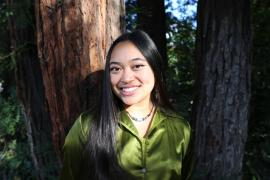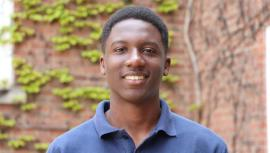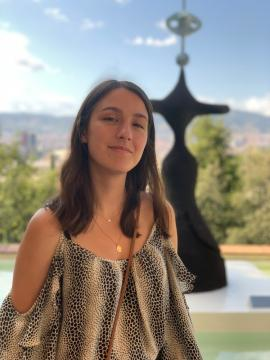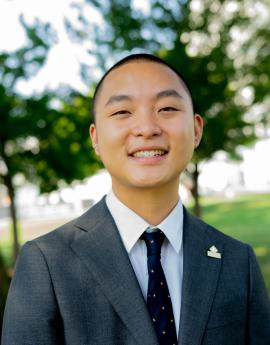The Center's multi-year programs and projects help it serve as the generative ideas accelerator that it is. As some programs and projects have scaled-up their activities, they also have benefited from the indispensable assistance of world-class students here at Stanford University.
This first occurred in a concerted way during summer 2019, when five Stanford undergraduate research assistants (RAs) made meaningful contributions to two CASBS projects: Creating a New Moral Political Economy, then ramping up activities as it head into its second year; and Understanding the iGeneration, then in the survey and data collection phase of what became its culminating product, the recently published book Gen Z, Explained. In summer 2020, four undergrad RAs helped advance moral political economy in its rapid growth from a project to a program consisting of multiple projects. Separately, one graduate student worked on an AI governance project that evolved into the current Towards a Theory of AI Practice project, part of a larger program called Humans, Nature, and Machines.
In 2021, five more Stanford undergraduates – Allison Sandoval Casasola, Eddie Dilworth, Uche Ochuba, Mara Stojanovic, and Matthew Zheng – rightfully can call themselves key contributors in their capacities as CASBS undergraduate RAs. One of them is even writing an occasional column in The Stanford Daily that is directly inspired by the CASBS experience.
Four of the five seized opportunities through Summer Research College (SRC), a program administered through Stanford Global Studies’ Program in International Relations and the Department of Political Science. Undergrads of all majors are eligible. Selected students earn a stipend and work with a faculty member and program directors on specified projects. One of the RAs, Allison Casasola, obtained support through The Changing Human Experience Undergraduate Researcher Program, which also confers a stipend for selected students.
Cassasola, Ochuba, Stojanovic, and Zheng worked on key projects within the ongoing Creating a New Moral Political Economy program. Ochuba and Stojanovic largely continued the work of predecessors working for moral political economy’s working group on pedagogy, which broadly seeks to understand how moral and political economy courses currently are taught and how they can be improved, with collected data and syllabi integral to an upcoming website that will serve as an online teaching and learning resource. They also provided CASBS director Margaret Levi with valuable background research on labor and workers’ rights that helped underpin her recent TEDx talk. Zheng contributed research essential for an article by Levi and collaborators on political power and inequality, soon to be published in the influential IFS Deaton Review. Casasola performed database work for “Imagining Adaptive Societies,” a recently-launched project within the moral political economy program that uses speculative fiction to help us imagine societies that are able to respond to the major challenges of our age, such as climate change. The idea is that speculative fiction provides a set of tools for building worlds and exploring, through social science expertise, novel social arrangements that may allow us to thrive in environments more sustainable and equitably.
Dilworth’s efforts, which continue, are in support of the Causal Inference for Social Impact Lab (CISIL). CISIIL attempts to advance both causal inference techniques for non-randomized designs and their application to the design and evaluation of public policies. Dilworth performed literature reviews and syntheses to help set the stage for a ‘data challenge’ where participating teams will submit plans and analyses involving real-world policies and data.
But hear it from them! We asked the five undergrads to elaborate and comment on their RA experiences with CASBS.

"In summer 2021, I worked on the project Imagining Adaptive Societies led by [2015-16 CASBS fellow] James Jones and Margaret Levi with the assistance of CASBS program director Zachary Ugolnik. I spent most of my time reading and writing about the most fascinating Speculative Fiction and Afrofuturistic novels as well as brainstorming partnerships that CASBS could pursue with the authors. I analyzed lessons that could be adapted from the novels to our society in order to solve pressing issues such as climate change. I hope that my preparations laid the groundwork for Imagining Adaptive Societies to collaborate with the authors, to popularize their novels, and to shine a light on the plethora of knowledge we can obtain from fiction. My time spent working on this project pointed me into a future direction where I wish to continue analyzing how we may work towards a more sustainable and fair world. "
Allison Sandoval Casasola is a sophomore planning to major in mathematics and philosophy.
Editor’s Note: Ally is modest! She now has an occasional column in The Stanford Daily called “Facing the Speculative,” in which she discusses “crucial speculative fiction novels and their implications for modern society.” She calls the column “an extension” of her CASBS experience.
Ally’s inaugural column focuses on Parable of the Sower by Octavia Spencer. Read it here. Her latest column takes inspiration from The Water Knife by Paolo Bacigalupi. Read it here.
* * *

"This past summer, I helped the Causal Inference for Social Impact Lab (CISIL) prepare to host its upcoming data challenge. Participating teams of academic researchers will apply causal inference methods to real-world datasets and policy questions provided by King County Metro [King County, WA, includes Seattle]; CISIL then will examine how the teams’ research decisions may have shaped their results and final policy recommendations. To prepare materials for the data challenge, I wrote summaries of the policy evaluations that teams will perform, specifically focused on the effects of fare subsidies and reinstatements on King County's public transportation ridership. I also helped with a literature review of previous studies of the importance of researchers’ hidden decisions—from the choice of covariates to handling missing data—to inform which decisions CISIL may want to examine. Working for CISIL helped me explore how the causal inference methods I am learning as a student can be applied to complicated questions and datasets, as well as how academic groups like CISIL and government agencies like King County Metro can form mutually beneficial partnerships. "
Eddie Dilworth is an undergraduate junior studying public policy and computer science, interested in working in environmental policy.
* * *

"My work on the Creating a New Moral Political Economy project involved working across different disciplines, as is the nature of the project itself. I looked at everything from climate change to human flourishing. However, most of my time focused on the U.S. labor movement in the past five years, documenting unionization actions and strikes, such as the unionization efforts at Google and Amazon. Unionization efforts at Amazon, for example, faced stiff resistance from higher-ups, who often use union-busting tactics that straddle the line of legality. Concurrently, the movement for a $15 minimum wage continues across the country. I learned about how the composition of the labor movement is changing, and how organizations are adapting to the evolving demands of workers across industries, particularly in the technology sector. While issues of pay remain important, ethical concerns and agency over the work they perform are increasingly cited by workers as a driver of unionization attempts and labor actions. The work I performed on the project aligns with my interests in technology, economics, and political science as a whole."
Uche Ochuba ‘24 is an undergraduate planning on majoring in symbolic systems or economics with a minor in creative writing.
* * *

"My experience working as a research assistant at CASBS on the Creating a New Moral Political Economy Project was incredibly fulfilling and enriching. I found that my work researching current alternatives to traditional forms of labor organization aligned with both my academic interests as a public policy student with a focus on crime, discrimination, and poverty policy and my passion for workers’ rights issues and labor movements. To me, this work served as an opportunity to highlight the innovative new approaches taken by people mobilizing around workers’ rights. By working for Professor Levi, I was able to explore these issues while learning about the potential for change in various other areas of the moral political economy. My time as a research assistant at CASBS solidified my interest in reimagining dominant political economic frameworks, in pursuit of ones that promote human flourishing."
Mara Stojanovic is a Stanford senior majoring in public policy and minoring in creative writing.
* * *

"I was hired by Margaret Levi and [former CASBS program director] Federica Carugati to serve as a Department of Political Science Summer Researcher in spring 2020 (on the eve of the COVID-19 pandemic!) to help with their work on moral political economies. Specifically, I was tasked with conducting research on the measurement and conceptualization of political power for a project on global political inequality which Margaret is co-authoring with Tim Besley and Pablo Beramendi. I had the wonderful opportunity to immerse myself in complex literature from a variety of disciplines including political science, sociology, and anthropology. I felt that my research helped to clarify the very tricky nature of political power and its measurement in various transnational and global settings, especially forms of political power which may not be superficially or obviously visible. I continued working with Margaret as her assistant through Summer 2021, at which point I completed my RA-ship and transitioned to focusing on my honors thesis with Margaret as my thesis advisor. My thesis is a political ethnography of LGBTQ+ movements, organizations, and people at the heart of American government in Washington, D.C. I absolutely credit Margaret and the hands-on work I engaged with as her assistant for sparking and nurturing a strong passion in me for studying political life using novel methods and bold aims, and I hope that I will be able to channel this experience into my plans for graduate study and beyond."
Matthew "Matta" Zheng (he/they pronouns) is a current senior double majoring political science and human biology, also writing an interdisciplinary honors thesis in feminist, gender, and sexuality studies. In the future, he hopes to complete graduate studies in political anthropology and social-spiritual medicine.
